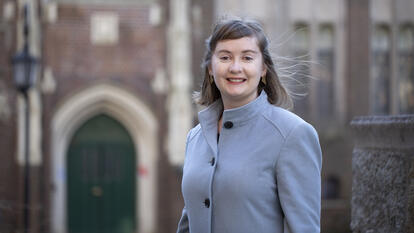Sociologist William Julius Wilson Delivers the 2017 Wilson Lecture

William Julius Wilson, author of the landmark books The Truly Disadvantaged: The Inner City, the Underclass, and Public Policy (1987) and When Work Disappears: The World of the New Urban Poor (1996), will deliver the Wilson Lecture, Wellesley’s premier lecture of the academic year, at 5 pm today, April 4, in the Diana Chapman Walsh Alumna Hall. The talk is titled “Reflections on Race, Class and Cumulative Adversity.”
Michael Jeffries, associate professor of American studies at Wellesley, said Wilson is one of the most influential scholars of the history of urban inequality. “Bill was among the first sociologists to sound the alarm about how the postindustrial economy was remaking the rules of racial inequality in the 20th century,” said Jeffries, who studied with Wilson at Harvard, where he is the Lewis P. and Linda L. Geyser University Professor and director of the Joblessness and Urban Poverty Research Program, Malcolm Wiener Center for Social Policy. “He coined the phrase ‘concentrated poverty’ to emphasize that not all poverty is the same, and that the neighborhood effects of poverty combined with racism can suffocate residents and keep them completely isolated from the legitimate economy. His contributions have forced all sociologists who work on economic inequality to reckon with the power of racism, and all who care about racism to situate their work in a broader economic context.”
To give some background for the inspiration behind the lecture he’ll give at Wellesley, Wilson said via email, “In November, shortly before the presidential election, I received an email from my Harvard colleague Henry Louis Gates Jr., who said he had to do a coda to the PBS television series Black America Since MLK to bring it up to date. And he asked me if I was optimistic or pessimistic about the future of our people. My lecture is a detailed response to that question.”
Wilson’s research over the last 30 years has consistently demonstrated that crime, family dissolution, welfare, and low levels of social organization are the result of the lack or disappearance of work, not the cause of it. As he told Mother Jones in 1996, “A lot of joblessness in the black community doesn’t seem to be reachable through fiscal and monetary policies. People have not been drawn into the labor market even during periods of economic recovery. Our study clearly shows that employers would rather not hire a lot of workers from the inner city.”
Wilson told the magazine that public-sector jobs would be necessary to get people back to work and that long-term programs must ensure that children are ready to enter the private labor market. “The problems we see today are going to be a hell of a lot worse in 10 years if we’re not willing to face up to them,” he said. “These kids are just not going to be absorbed into the economy.”
In 2012, Wilson spoke to National Public Radio about the 2011 Census Bureau report, which showed that 15 percent of Americans—more than 46 million people—were living at or below the federal poverty line, and more than half of them were Black or Hispanic. The report also revealed that the gap between the middle class and the affluent had widened significantly in the previous 32 years.
“If you talk about inequality, of course, race is still a very, very important factor in accounting for the differences between Blacks and whites,” Wilson told NPR. “But if you want to explain the rising inequality since 1980, then you have to look at a different set of factors that relate to economic class. And…the research is quite consistent. The sharp increase in inequality is driven mainly by the super-rich, whose incomes have skyrocketed the last several years.”
In his Wellesley lecture, Wilson said he will discuss significant trends in income segregation, including the fact that since the death of Martin Luther King Jr. in 1968, conditions for poor Blacks have deteriorated while the conditions of better-off Blacks have improved, a change that is clearly seen in the growing income inequality in the Black community. “Income segregation among Blacks in large metropolitan areas has notably increased,” he said. “Indeed, poor Black families have fewer middle-class Black neighbors than they had in 1970.”
Wilson will also discuss how growing income segregation among Blacks is exacerbated by racial segregation among Black families of different income levels and how income segregation, coupled with racial segregation, affects public schools, the social organization of neighborhoods and exposure to violent crime, and the plight of young low-skilled Black males. He will also suggest policies to address these problems in the age of Donald Trump and beyond.
“One thing that will be evident [from the lecture] is that Bill is a scholar who has accomplished so much over the course of his career, yet remains so passionate about what lies ahead,” said Jeffries. “He has rare generosity and intellectual curiosity, and has served as a model for several generations of scholars. We remain inspired by his research and the example he sets as a mentor.”
The Wilson Lecture is generously funded by an endowment from Carolyn Ann Wilson, Class of 1910, who worked for the Chicago Tribune and was one of the few female war correspondents in the world to cover World War I. In 1962, she endowed this lecture to help bring scholars to Wellesley to discuss significant issues of the day. The event is free and open to the public both in person and via live webcast.



